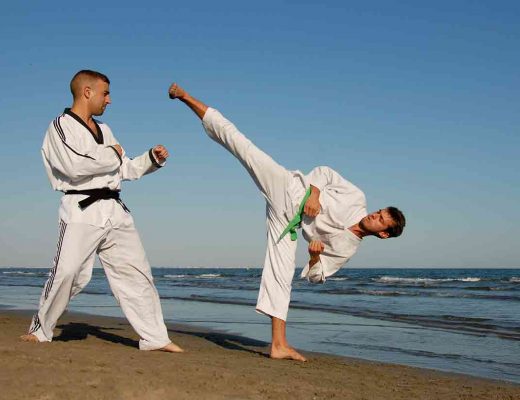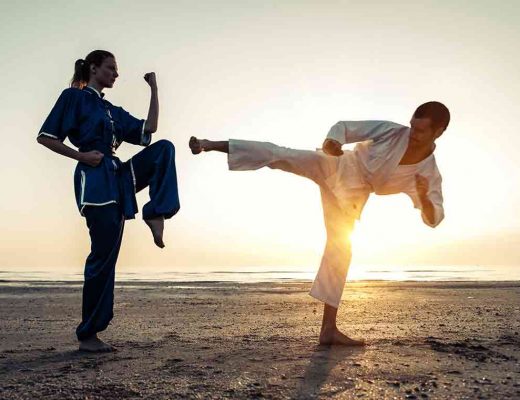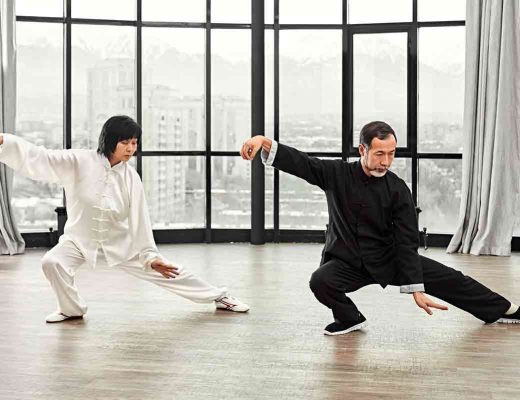Introduction
How to choose a martial art to study you ask?
With hundreds of different martial arts to date, it can be tough trying to decide which one to study.
There’s just so many choices out there that it can lead anyone into analysis paralysis just trying to pick out which one to study.
Each martial art has advantages as well as its drawbacks, but that isn’t the only things you should consider.
Pick the wrong one and you’ve just wasted months and even years of your life in something that you don’t enjoy studying.
In this article, I will discuss key things that you should consider when trying to decide what martial art to study.
Here are the key things to consider:
- Your body type
- Your age
- What are your goals for studying martial arts?
- Do you enjoy mediation and philosophical concepts?
- Do you enjoy striking or grappling or both?
- Do you want to compete in the Olympics?
- Do you want to be a professional fighter?
- Do you want to learn weapons training?
- Your budget
- The school
Your Body Type
Your body type could very well determine which style of martial arts is most suitable for you.
Things like how tall you are, how much you weigh, your build should play a role when your trying to choose a martial art to study.
I remember when I tried out Wing Chun for the first time.
I felt extremely uncomfortable in those small, cramped, awkward positions for hours on end.
After sticking with it for a few months, I decided to quit and try something else.
Then later on when I tried Muay Thai and Boxing, I instantly fell in love with these martial arts.
They suited a taller bigger built guy like myself rather then the smaller individual studying Wing Chun.
When your trying to decide which martial arts to study, its important to consider whether or not that style of martial arts is suitable for your body type because you will undoubtedly need to spend years learning the martial art to become proficient at it.
Different body types will not only benefit from a particular martial art, it will also determine how comfortable and easy learning that martial art will be.
If your a small guy, there may only be a handle of martial arts that are suitable for you.
I wrote an article about this here.
Taller individuals may want to consider something that allows more freedom of movement and to take advantage of their long limbs such as a striking martial art like kickboxing or Taekwondo.
Your Age

Each martial art’s style caters to different age groups.
For some physically demanding martial arts that do a lot of sparring such as Muay Thai, it may not be suitable for seniors that have a wealth of medical conditions such as osteoarthritis or hip pain.
The last thing you want to do is have a hip fracture while trying to take someone’s head off with a high kick.
A more softer style and gentler approach to learning would then be required such as Tai Chi or Aikido.
For kids, a good starting martial arts might be something like Kung Fu, Karate, or Taekwondo.
These martial arts help build strong foundations that can be applied and transitioned over to other styles of martial arts such as kickboxing or Muay Thai later on if they so choose to.
Young adults or middle aged adults with angry management issues that have watched one too many UFC fights may need something like boxing or mixed martial arts to help them release all that pent up anger.
What Are Your Goals for Studying?

Each person that decides to study a martial arts will have a different goal.
For some people they just want to exercise and stay healthy.
Maybe they just got bored of walking and running all day on the treadmill and just staring at the wall.
I don’t blame them.
Doing that crap for months on end is enough to drive anyone insane!
I would rather sweat my ass off sparring 12 rounds in a boxing ring with an opponent 2 weight classes above me then have to spend more than 10 minutes on that soul sucking apparatus.
For others, it may be because they got bullied at school and now want to learn how to defend themselves.
Ask yourself this question.
What are my goals for studying martial arts?
- Fitness and health?
- Self defense?
- Increased confidence and self esteem?
- Want to yell like Bruce Lee or do the splits like Jean Claude Van Damme?
Do You Enjoy Mediation and Philosophical Concepts?
Some people love the old traditional ways of martial arts that not only teach the physical aspects of martial arts but also the mental aspects as well.
Traditional martial arts tend to have a bit of a focus on teaching things like mediation to help students calm their minds, practice qigong, and philosophical theories and concepts.
Do you enjoy these things or think that you would enjoy learning them?
Or
Would you rather stick to just the practical aspects and physical applications of martial arts such as mixed martial arts?
If your interested in the more mental and philosophical areas of martial arts then these martial arts would be a good fit for you:
- Jeet Kune Do
- Karate
- Kung Fu
- Taekwondo
- Taichi
- Aikido
Do you Enjoy Striking or Grappling or Both?

Do you want to learn how to punch, kick, and throw strikes or do you want to learn how to grapple and do throws?
For some people, they enjoy hitting and striking people or objects.
In those cases, learning a hard style martial arts would be better suited for them such as Taekwondo or Kung Fu, as those martial arts place a heavy emphasize on strikes.
Someone looking to learn how to throw kicks and punches will easily get bored if you instead placed them in a place teaching how to grapple or doing qigong.
A UFC fanboy on the otherhand that is obsessed with grappling will feel like he’s wasting his time studying a traditional martial arts like Karate.
His time would be better spent learning a martial arts like Judo or Brazilian Jiu Jitsu instead.
Some people may even enjoy both types of martial arts in which case, studying something like mixed martial arts, Sambo, or Krav Maga may be better for them.
I remember signing up for a Tai Chi class at my university’s athletic center one summer.
I had previously taken an introductory Tai Chi class from another university and was looking forward to continuing my tai chi studies again.
I was stoked about class after watching tonnes of videos of Tai Chi practitioners doing all sorts of cool and graceful moves on YouTube that day, however when class started, all the instructor did was make me stand at one spot for several minutes and just close my eyes and breath.
In the back of my mind I was thinking “What the hell is this crap?”.
It certainly was not what I had envisioned and signed up for.
After spending nearly the whole class doing this meditation like exercise, I felt deceived and pissed off.
I soon made my way over to the registration desk and got a refund!
Do You Want to Compete in the Olympics?
Many people dream about competing in the Olympics and representing their country and bringing home that solid piece of gold medal to hang on their wall, but there actually aren’t that many martial arts in the Olympics.
If your goal is to compete in the Olympics then you better make sure the style of martial arts that your studying is competing in the Olympics.
Here is a list of martial arts currently in the Olympics:
- Boxing
- Taekwondo
- Karate (Starting in 2020)
- Judo
- Wrestling
- Fencing
Do You Want to Be a Professional Fighter?

If you have a dream of turning professional one day, know that there are only a handful of martial arts styles out there that can help you realize this dream.
You don’t see a Tai Chi practitioner using Tai Chi moves at a K1 or UFC tournament now do you?
They would most likely get clobbered using those techniques in a combat sport type of situation.
Martial arts such as the following provide a good basis for turning pro later on:
- Boxing
- Kickboxing
- Muay Thai
- Mixed Martial Arts
- Brazilian jiu jitsu
- Savate
- Wrestling
- San Shou (Sanda)
- Kyuktooki (Korean kickboxing)
- Kyokushin Karate
Its important to keep this in mind if you intend on competing professionally later on and selecting the right martial arts to help you achieve that goal.
Do You Want to Learn Weapons Training?
Only a handful of martial arts actually do teach weapons training.
If your interested in learning how to swing that nunchaku around and not knock out all of your teeth or how to slice and dice someone in half with a Katana sword then you should consider these martial arts:
- Kung fu
- Taekwondo
- Karate
- Aikido
- Kendo
- Gumdo
- Kobudo
- Escrima
- Fencing
- Krav Maga
I would avoid these martial arts if your interested in learning weapons training:
- Boxing
- Muay Thai
- Mixed martial arts
- Judo
- Brazilian Jiu Jitsu
Your Budget
At the end of the day money talks.
Sure their might be some great schools with awesome instructors out there that pump out world champion fighters, but if you can’t afford the high price tag, then forget it!
Each martial arts style and even the schools charge different prices for study.
For example a Muay Thai school might just charge you the following fees:
| Annual Membership Fee | $1200 ($100 a month x 12) |
| Short Testing Fee | $200 |
| Sparring Gear | $400 |
| Miscellaneous Expenses | $100 |
| Total | $1900 |
Whereas you might see the following fees at a Taekwondo school:
| Annual Membership Fee | $1200 ($100 a month x 12) |
| Belt Testing Fee | $400 |
| Sparring Gear | $400 |
| Tournament Entrance Fees | $200 |
| Miscellaneous Expenses | $100 |
| Total | $2300 |
In addition to the quality of instruction, you also need to consider the costs of membership fees.
Will you be able to afford the annual costs associated with your membership and to continue paying them as you continue on with your martial arts journey?
Martial arts study does not just end after 3 months of study, they take years and even decades to master.
Plan your budget accordingly.
Also if your on a budget you may want to only consider studying either at public community centers, community colleges or universities to keep costs down. Keep in mind that their tends to be a lot less lessons being offered during the week at these places compared to a real school, and the selection of martial arts styles will be limited as well.
However you can expect quite a big savings compared to going to a martial arts school that is for profit.
The School

No such thing as bad student. Only bad teacher.
Mr. Miyagi
Just as important as the martial arts that you choose to study is also the school where you are learning the martial art.
A crappy teacher only focused on pumping out mediocre students that they can milk as much money from will almost always yield a poor learning experience.
I remember signing up for a trial lesson at a Taekwondo school back when I was still in high school that was near my house.
The instructor who greeted me when I first went in and who carried out the lesson seemed like a nice guy, however the owner and master instructor who I later met that evening was the complete opposite.
He seemed only focused on extracting money out of my father’s wallet and kept on pressuring him to signup for lessons like a sleazy salesman.
Needless to say, I didn’t join that school.
I later discovered that school was a mcdojo from word of mouth.
A good quality martial arts school should provide excellent instruction to their students and have developed a good reputation through word of mouth.
A good school doesn’t need to corner prospective students and pressure them to signup because they know their reputation will speak for themselves.
If you want to know whether or not a school is good, ask to observe an advanced level class before you decide to signup in addition to trying out a class or two.
Its also important to read reviews online as well, although those can be faked nowadays.
Conclusion
Before jumping head first into any martial art that is available to you, its important to consider things like your age, your physical conditioning and body size, what your goals are, what style of martial arts you prefer, whether or not your looking at competing in tournaments and the Olympics, the costs, as well as the level of instruction.
Learning martial arts brings tremendous benefits to any practitioner that put their heart and soul into the art, but its important to find one that is suits your needs and makes you passionate to attend classes.
I hope this guide has been of some help to you and serves as a guideline for selecting the right martial arts for you.




No Comments